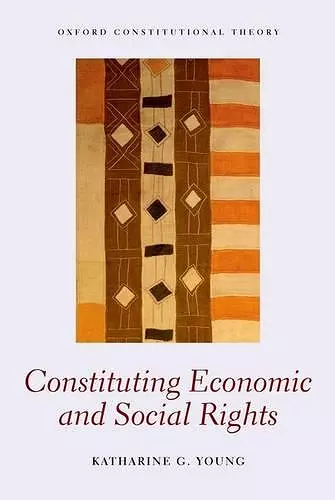Constituting Economic and Social Rights
Exploring the evolution of rights to dignity and freedom
Format:Paperback
Publisher:Oxford University Press
Published:30th Oct '14
Currently unavailable, currently targeted to be due back around 25th January 2025, but could change
This paperback is available in another edition too:
- Hardback£127.50(9780199641932)

This insightful book examines the evolution of socio-economic rights into constitutional rights and their implications for public law and social justice.
The book Constituting Economic and Social Rights delves into the essential nature of socio-economic rights as fundamental to human dignity and freedom. It emphasizes that rights to food, water, health, housing, and education are as critical as rights to privacy, religion, or speech. Despite their importance, it has only been in recent years that legal systems have begun to recognize and secure these rights. This transformation is at the heart of the book's exploration, as it analyzes how socio-economic rights have evolved into constitutional rights and their implications for public law and constitutional theory.
Through a comparative lens, Constituting Economic and Social Rights investigates various constitutional frameworks from countries like South Africa, Colombia, Ghana, India, the United Kingdom, and the United States. The author examines the innovative roles played by institutions such as courts, legislatures, and executive agencies in safeguarding these rights. This analysis highlights the dynamic interplay between social movements and market forces, revealing how legal systems can effectively protect socio-economic rights by focusing on value-based, deliberative problem-solving rather than merely minimum entitlements.
The book argues that by shifting this focus, legal systems can better address material inequality and social conflict. It also discusses the potential for these rights to coexist with democratic and market principles, offering a fresh perspective on the intersection of law, governance, and social justice. Ultimately, Constituting Economic and Social Rights is a significant contribution to understanding how socio-economic rights can be integrated into constitutional frameworks.
Social and economic rights are growing apace throughout the world. Anyone seeking a thoughtful and comprehensive overview of the different ways in which courts throughout the world are enforcing them could do no better than read this sharp-eyed and fluent book. * Albie Sachs *
Katharine Young proposes an original theory about the development of economic and social rights, linking such development to their philosophical foundations, to their institutionalization in binding legal norms, and to their impacts in real life. It is an illuminating and well-informed account of how rights evolve, as a result of the tensions between these poles. This book is a breakthrough in scholarship on economic and social rights. * Olivier De Schutter, Former UN Special Rapporteur on the right to food (2008-2014), Member of the Committee on Economic, Social and Cultural Rights (2015-2018) *
Young's work comes from a deeper sense of injustice with current world affairs and offers an imaginative and thought provoking account of the potential merits, and pitfalls, of rights based constitutionalism. * Jamie Burton, Public Law *
A brilliant discussion of an extremely difficult subject of great importance to policy making and practical reasoning. Katharine Young's lucidity is exemplary, and so is the originality of her approach to human rights. * Amartya Sen, Nobel Prize winner in Economics and Thomas W. Lamont University Professor, and Professor of Economics and Philosophy, at Harvard University *
Katharine Young's book is both an ideal introduction to the discourse of social and economic rights and an important advance of the field. She offers a spirited defense of the possibility of a human rights practice that is both grounded and emancipatory. Skeptics will find that their reservations are extensively and fairly considered. Activists will find many provocative challenges to their conventional wisdom. All readers will be grateful for her lucid and lively exposition. * William H. Simon, Arthur Levitt Professor of Law, Columbia Law School *
ISBN: 9780198727897
Dimensions: 238mm x 162mm x 46mm
Weight: 832g
376 pages